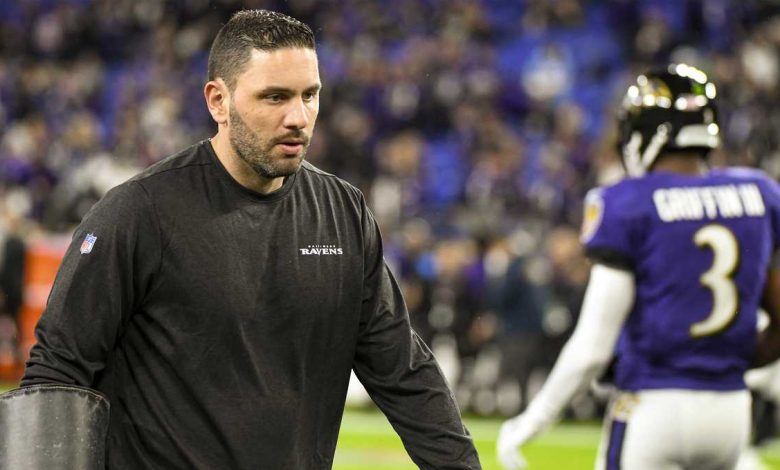Former NFL, Michigan assistant coach Matt Weiss charged with hacking for athletes’ intimate photos.

The world of college football was rocked by a significant scandal that unfolded in early 2025, when Matt Weiss, a former assistant coach at the University of Michigan and former NFL coach, was arrested and charged with a serious criminal offense: hacking into university systems to steal intimate photos of athletes. The allegations have left the college football community, fans, and the broader sports world in disbelief. Weiss, who had a successful coaching career both at the NFL level and in college football, is now facing legal ramifications that could significantly alter his future and raise important ethical questions surrounding privacy and technology in sports.
In this article, we will break down the charges against Matt Weiss, explore the implications of his actions, and examine the broader questions of privacy, technology, and the impact of this scandal on the University of Michigan football program and the college sports landscape.
Who is Matt Weiss? A Look at His Coaching Career
Before becoming embroiled in this shocking scandal, Matt Weiss had built a respectable career in the football world, especially as a coach known for his strong technical acumen and offensive strategies. Weiss started his career in college football before transitioning to the NFL, where he worked as an assistant coach. His experience in both professional and college football gave him a well-rounded perspective on how to develop and nurture athletes at different levels.
Weiss had served as the quarterbacks coach and offensive coordinator at Michigan, where he played a pivotal role in developing some of the top quarterbacks in the nation, including players who were poised to make a splash in the NFL Draft. His tenure in college football also extended to a brief but impactful stint with the NFL, where he worked as an assistant with the Baltimore Ravens and was known for his expertise in developing offensive systems that catered to young quarterbacks.
Given his resume, Weiss was viewed as a rising star in the coaching world—someone who could take on greater responsibilities within the college football landscape. His ability to mentor young players and his extensive background in high-level football had made him a respected name in the sport. However, this criminal case now overshadows his coaching achievements, and his reputation has taken a massive hit.
The Allegations Against Matt Weiss
The charges against Weiss are deeply troubling and have cast a dark shadow over his career. He has been accused of hacking into university systems in order to access private, intimate photos of athletes. These allegations suggest that Weiss had access to sensitive data and used it for illicit purposes. Reports indicate that Weiss allegedly gained access to personal accounts, including email and social media accounts of students, and extracted private images that were not meant for public view.
The charge of computer fraud and abuse comes with significant legal consequences, including potential prison time and hefty fines. Hacking is a serious offense, particularly when it involves personal privacy and the exploitation of individuals for personal gratification or illicit purposes. If these allegations are proven to be true, Weiss could face significant legal consequences that would not only affect his professional career but could also serve as a warning for the broader sports world.
The nature of these charges also raises critical questions about the intersection of technology, privacy, and the potential for exploitation. In an era where personal data is increasingly vulnerable to breaches, this case highlights the importance of protecting sensitive information and maintaining ethical standards in the way coaches and administrators interact with student-athletes.
The Impact on the University of Michigan
The allegations against Matt Weiss have had a profound impact on the University of Michigan’s football program and the broader university community. Michigan is one of the most storied programs in college football history, and any scandal involving a member of its coaching staff brings significant scrutiny and damage to the university’s reputation.
Michigan’s athletic department has expressed outrage and disappointment over the charges and has fully cooperated with law enforcement officials in the investigation. As the investigation progresses, the university will likely take further steps to address the situation, which may include disciplinary actions, such as termination of employment, and more proactive measures to prevent similar incidents from occurring in the future.
The university’s response to this scandal will be closely watched by other athletic programs across the nation, as it will set a precedent for how colleges handle misconduct and privacy violations involving coaching staff. The implications of the Matt Weiss hacking scandal extend far beyond the football program, as it raises questions about institutional responsibility, privacy protections for athletes, and the ethical boundaries that should govern relationships between coaches and players.
The Broader Implications of Hacking in Sports
The charges against Weiss also bring to light some important and often-overlooked issues regarding privacy and technology in sports. In a world where personal data is increasingly stored digitally, the opportunity for exploitation and misuse is a growing concern. Athletes, particularly college students, are often in vulnerable positions where their personal information may be easily accessible to those in positions of power, such as coaches, athletic staff, and administrators.
The case against Weiss serves as a stark reminder of the potential for abuse in situations where athletes’ personal information is involved. The breach of privacy has long-lasting consequences for the individuals affected, and it raises significant ethical questions about how institutions can protect their students from harm. The following key points provide a broader perspective on the matter:
- Data Security: As technology continues to advance, institutions must place a greater emphasis on safeguarding athletes’ personal data. Sports organizations must implement strict policies and invest in robust cybersecurity measures to protect athletes’ sensitive information. This includes personal photographs, messages, and other private material that should never fall into the hands of anyone without consent.
- The Role of Coaches: Coaches are entrusted with a great deal of responsibility, both in terms of mentoring athletes and in maintaining ethical standards. The case of Matt Weiss demonstrates that coaches must be held to the highest standards when it comes to respecting the boundaries of their players. Any breach of trust or abuse of power has severe consequences for both the coach and the institution they represent.
- Privacy for College Athletes: College athletes face unique challenges when it comes to balancing their personal lives with the demands of their athletic careers. The constant exposure to public scrutiny, coupled with the intense pressure to perform, often leads to feelings of vulnerability. The need for greater protections regarding athletes’ privacy cannot be overstated, and this case underscores the importance of creating policies that protect students from potential violations.
- Legal Precedents: The legal ramifications of this case could set a precedent for how cybercrime and misuse of technology are handled in the world of sports. If Weiss is convicted, this could lead to stricter regulations and enforcement policies, with universities and athletic programs facing greater scrutiny when it comes to data protection.
The Fallout for Matt Weiss
For Weiss, the fallout from these allegations has been swift and severe. As of now, he has been suspended from any further coaching duties, and his future in the sport is uncertain. If found guilty, Weiss could face substantial prison time under the Computer Fraud and Abuse Act, which carries penalties for individuals found guilty of hacking into computer systems for personal gain or harm.
Even without a criminal conviction, Weiss’s career in coaching is likely over. Coaching is a profession built on trust, integrity, and the ability to mentor and lead young athletes. The allegations against Weiss suggest a profound betrayal of that trust, and it is hard to see how any institution, professional or collegiate, would be willing to hire him after such a scandal.
Moreover, the case could have a long-term impact on how coaches are vetted and monitored, especially in high-profile programs. Teams and institutions may introduce stricter background checks, privacy guidelines, and training to ensure that similar incidents do not occur in the future. This could result in increased accountability for coaching staff, leading to a cultural shift in how college sports operate moving forward.









